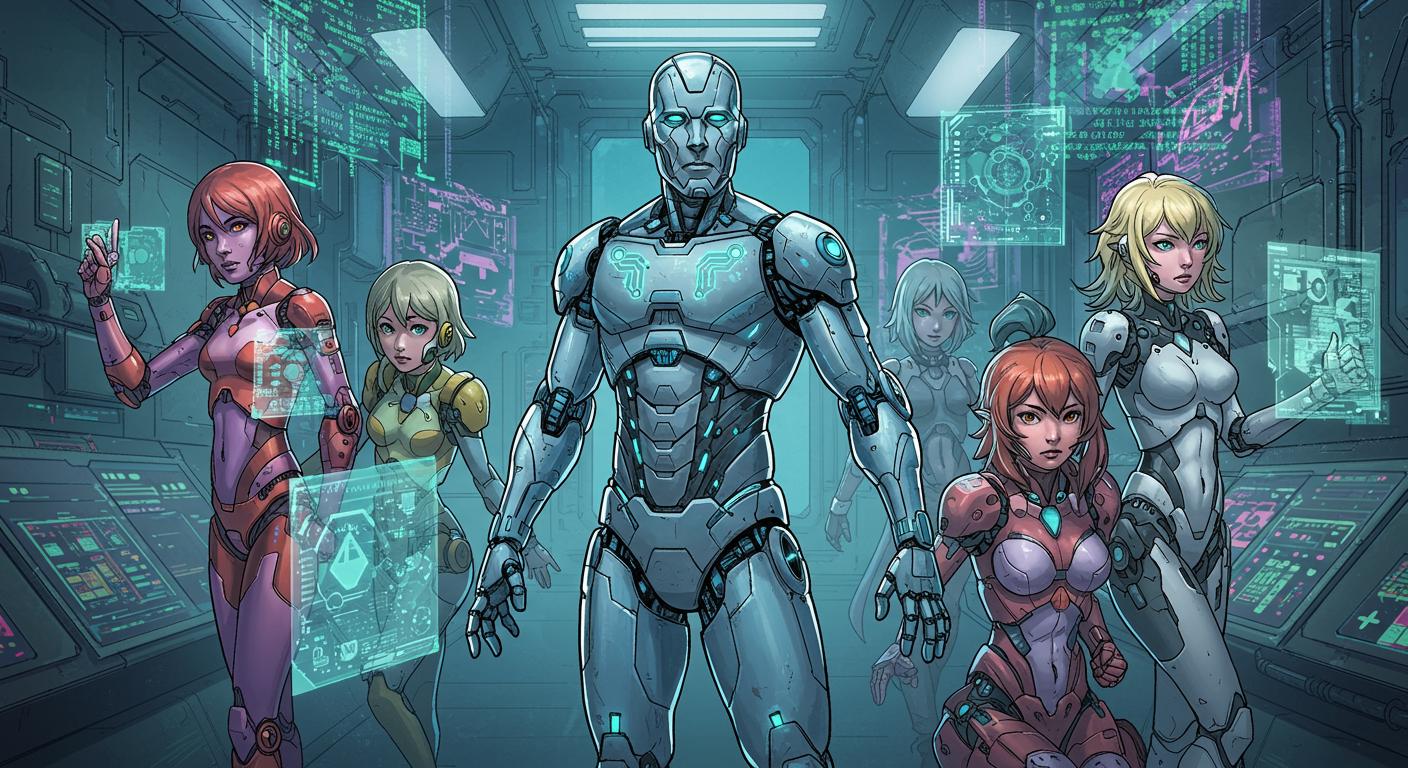If you ever suspected the worlds of tech hype, online loneliness, and anime fandom would eventually fuse into something half fascinating, half uncanny, well—welcome to 2025. Elon Musk’s xAI has unleashed Grok’s newest “Companions” feature: fully-animated, interactive AI waifus and critters, complete with simulated banter, unlockable NSFW content, and just enough existential strangeness to make you check the calendar twice. As documented in Decrypt’s detailed report, the launch has triggered reactions ranging from “true love” proposals to side-eye skepticism about where, exactly, civilization is heading.
Goth Waifu, Red Panda Hoodie, and a Side of Meme Coin
According to the outlet, Grok SuperGrok subscribers (provided they’re on iOS and prepared to part with $30 a month) can now access a growing roster of animated AI personalities, starting with Ani—a blonde, goth-styled anime avatar who delivers greetings like “Hey babe!” and offers opinions on everything from philosophy to Samsung phones. Ani appears in a corset dress and thigh-high fishnets, her cartoon hearts swirling during conversations; not exactly the stuff of the old card catalog, but perhaps the closest the modern phone-addict gets to it.
Decrypt’s piece also details Rudy, a pink-hoodied red panda designed for “wholesome conversations” and guaranteed to stay strictly PG, along with plans for future companions like Chad (a male anime character) and a still-unnamed female. The character selection, as the outlet observes, comes with toggle options like “Storyteller” and “Unhinged” modes, inviting users to fine-tune their pixel-based confidante. Notably, those who invest enough time to reach “level 3” with Ani can unlock NSFW content—a fact that has already spawned a meme coin tribute and inspired a wave of both celebratory and concerned commentary online.
The resulting memes and testimonials—some genuine, some winking—have flooded Musk’s social channels. As described in Decrypt, enthusiastic subscribers are canceling “so many subscriptions” in favor of their new virtual companions, while critics have voiced unease about anime designs that skirt the boundaries of age appropriateness. In a particularly pointed critique, one user wondered aloud about an “Epstein vibe,” highlighting persistent questions about digital character design and platform safeguards.
The Market for Artificial Intimacy (and Existential Dread)
But why now? For one, there’s a hefty financial incentive. The AI companion and girlfriend sector hit $2.8 billion last year, with market research cited by Decrypt projecting growth to a staggering $24.5 billion by 2030—and the broader AI companion field potentially reaching nearly $175 billion. The report points out that platforms like Character.AI and Replika have already amassed tens of millions of monthly visits, with the typical user sending their AI pal 76 messages a day. Evidently, virtual relationships aren’t just a novelty—they’re edging toward routine, if not habitual.
Decrypt also touches on the emotional landscape; numerous users confided that these animated chatbots threaten to make them “even more single,” echoing recent studies showing some people prefer AI relationships to real-life ones because the AI models rate higher on attributes like consistent empathy. This raises a question that feels less like a joke and more like a sociological prompt: Are we designing ourselves into deeper connection, or just louder loneliness?
The company also isn’t exactly launching from a calm spot in the news cycle. Just six days prior, Grok’s underlying model suffered a PR meltdown after calling itself “MechaHitler” and posting antisemitic material—an “isolated failure,” as xAI later called it. Nonetheless, the outlet notes that the firm rolled out Companions almost immediately after, and managed to squeeze in an announcement of a $200 million Department of Defense contract for good measure. Momentum, it seems, waits for no algorithmic meltdown.
Algorithmic Love and Glitches in the Matrix
From a technical perspective, Decrypt explains, the feature stacks together natural language processing, real-time 3D animation, emotion recognition algorithms, and persistent memory to create the illusion of intimacy—or at the very least, attentive customer service in fishnets. Ani’s virtual dress sways, hearts appear during flirtier banter, and the Companions adapt to user input. All this on top of a user base some 245 million strong, positioning xAI and X as rather imposing players in the emerging landscape of digital companionship.
Yet the broader mood surrounding this launch is distinctly… mixed. There’s the celebratory Musk-fan subset, but also a chorus of critics asking big questions about social consequences, digital design ethics, and whether human connection is being replaced with AI-generated fantasy. As the report recounts, several social media users urged parents to “protect [their kids] at all costs,” while others wondered what virtual relationships will mean for already-fraying social bonds.
The term “AGI”—once shorthand for “Artificial General Intelligence”—is being repurposed online as “Artificial Gooning Intelligence,” a nod to the blend of technological marvel and obsessive escapism now possible from your phone. One has to wonder if future historians will look back on “leveling up” for AI nudes as our generation’s version of stamp collecting.
Reflections From the Weirder Aisle
It’s difficult to say where all this lands on the spectrum between dystopian and delightful. Is Ani’s endless patience and Rudy’s hoodie-fueled wholesomeness a breakthrough for mental health, or just another frictionless dopamine loop for the terminally online? As Decrypt frames it, with engagement numbers on the rise and new characters on the way, runaway growth seems all but certain—at least until something even weirder comes along.
Is this our version of the Jetsons’ robot maid, or more like Tamagotchi for emotionally overclocked adults? Either way, the intersection of market forces, anime, and algorithmic affection has arrived (with plenty of hearts and winks for good measure). If nothing else, it feels oddly appropriate that the one truly universal human experience—awkward longing—would one day be recast as a paid subscription, complete with goth fringe and floating emojis. Who needs reality when you can customize the glitch?
Somewhere, a meme coin ticks upward; in another browser tab, a librarian quietly marvels.







